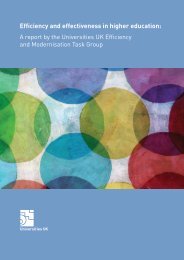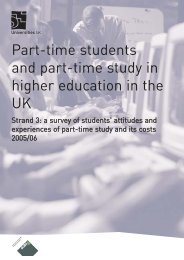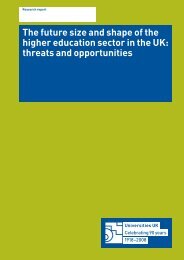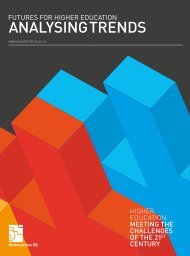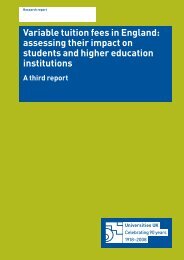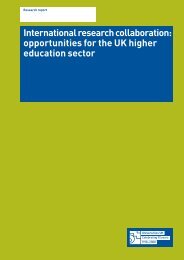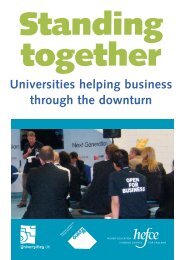The future of research - Universities UK
The future of research - Universities UK
The future of research - Universities UK
You also want an ePaper? Increase the reach of your titles
YUMPU automatically turns print PDFs into web optimized ePapers that Google loves.
9<br />
<strong>Universities</strong> <strong>UK</strong> – <strong>The</strong> <strong>future</strong> <strong>of</strong> <strong>research</strong><br />
Stakeholders within the <strong>UK</strong><br />
An important element in the political agenda which has developed over the<br />
last quarter-century is the expectation <strong>of</strong> ‘impact’ for university <strong>research</strong>. <strong>The</strong><br />
progressive shift in focus to the economic and social impact <strong>of</strong> <strong>research</strong> is seen,<br />
for example, in the Research Councils’ grant application process, which requires<br />
applicants to consider potential impacts. This agenda may vary in emphasis, but<br />
it will not disappear. <strong>Universities</strong> should take ownership and interpret the way in<br />
which it can be met. It will need to be internalised as a part <strong>of</strong> the sector’s pact<br />
to meet sustained investment with a flexible and adaptive response. It must be<br />
adapted to all disciplinary cultures. It must not be forced on a reluctant sector<br />
in a haphazard and maladapted way.<br />
<strong>Universities</strong> face a complex task in balancing potentially<br />
competing external expectations, even demands. <strong>The</strong> ‘stakeholders’ are the<br />
interest groups who stand to benefit or suffer from a more or less effective<br />
performance by the universities. Since taxes pay for universities, public interests<br />
are usually represented by government. But government also seeks to represent<br />
industry which benefits competitively from trained people as well as innovations<br />
and thereby boosts the economy.<br />
Government has not always expressed its expectations well<br />
but universities could be accused <strong>of</strong> being complicit by failing to deconstruct<br />
and reinterpret those expectations in more coherent and constructive forms. In<br />
the translation <strong>of</strong> discovery into innovation, <strong>UK</strong> policy culture has presumed that a<br />
deficit exists and that the fault lies with the producer. But even the deficit is open to<br />
question. <strong>The</strong> <strong>UK</strong> has a strong biomedical <strong>research</strong> base where it has a world lead<br />
in output quality and where the pharmaceutical sector invests heavily in R&D and<br />
has excellent links with universities. Other leading companies, such as Rolls Royce,<br />
stand out for similarly good links with excellent <strong>research</strong>. <strong>The</strong> generic record for<br />
business is dismal, however, for while the <strong>UK</strong>’s comparative <strong>research</strong> quality has<br />
improved so the level <strong>of</strong> BERD as a share <strong>of</strong> GDP has fallen.<br />
Cycles <strong>of</strong> government innovation policy have focussed<br />
on universities as the sector most readily levered, but have not analysed the<br />
coherence <strong>of</strong> expectation. University <strong>research</strong> cannot respond in a short cycle,<br />
nor does it focus on existing need so much as <strong>future</strong> opportunity, nor can it force<br />
its output on industries which lack the capacity to use the knowledge.<br />
Why are the expectations unrealistic? Those in industry, in<br />
the NHS, and in other public sector agencies, have only infrequently been able<br />
to articulate, perhaps even to conceive, what they really need from university<br />
<strong>research</strong>. More people are needed among both <strong>research</strong> producers and users<br />
who can engage in an appropriate dialogue. We argue, and develop this<br />
argument further in the context <strong>of</strong> workforce competency, that the capacity to<br />
articulate possibilities, needs and responses across this boundary could be a<br />
firmer and more achievable policy goal ahead <strong>of</strong> unquantified expectations.<br />
A two-way movement <strong>of</strong> <strong>research</strong>ers – able to translate <strong>research</strong> opportunity<br />
into social, economic and technological sectors – and <strong>of</strong> industrialists, able<br />
to explore development opportunities and mentor budding <strong>research</strong> talent in<br />
wider development pathways, could entrain the transfer <strong>of</strong> useful knowledge<br />
far more effectively than initiatives focussed on knowledge transfer alone.





